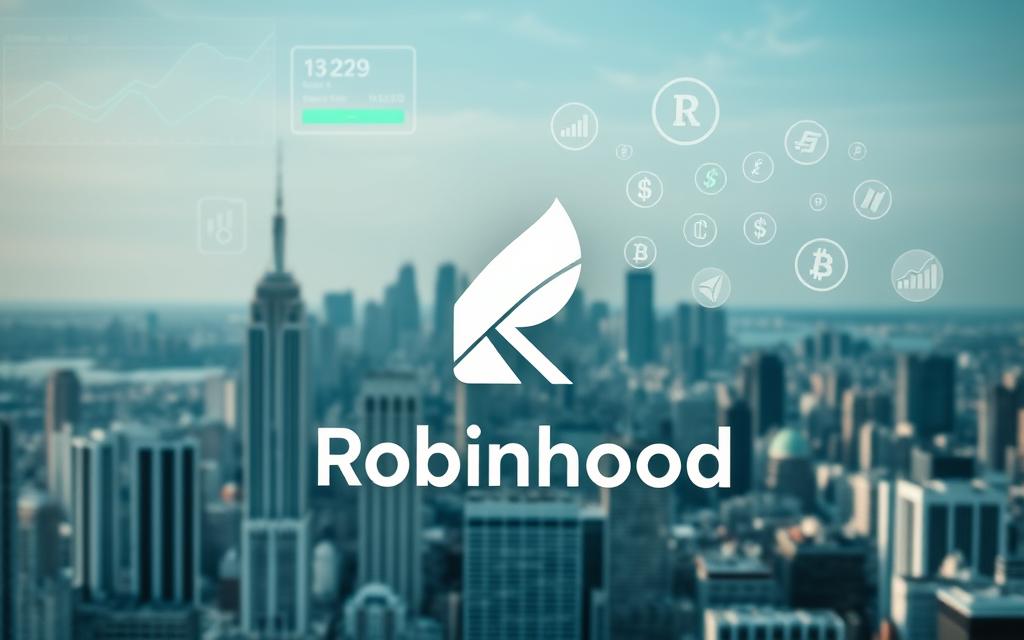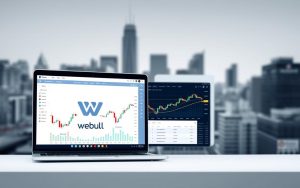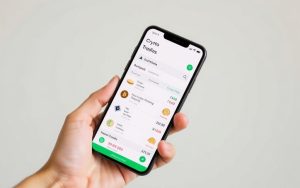Table of Contents
Robinhood transformed stock trading with its commission-free model and mobile-friendly design. Now, it extends those features to digital assets, offering seven major cryptocurrencies. But does this platform truly cater to modern traders?
The 2021 GameStop incident raised concerns about restrictions during volatile markets. This event also impacted how users view Robinhood’s approach to crypto. While its simplicity attracts beginners, experienced investors may find the selection limited.
Key factors like wallet limitations and security protocols play a role. Millennials and Gen Z users favor its intuitive interface, while traditional traders often prefer advanced tools. Upcoming features, including wallet transfers in 2025, could shift the landscape.
How does it stack against giants like Coinbase or Binance? We’ll examine fees, usability, and real-world performance to help you decide.
Introduction to Robinhood Crypto
With its 2018 launch, Robinhood Crypto introduced commission-free trading for Bitcoin and other leading cryptocurrencies. This extension of the stock trading app lets users buy and sell digital assets alongside traditional investments. Over 2 million people joined its waitlist, signaling strong demand for accessible crypto options.
What Is Robinhood Crypto?
Robinhood Crypto operates as the digital asset division of the broader trading platform. Unlike traditional exchanges, it integrates seamlessly with stock and ETF portfolios. Key features include:
- Zero-commission trades on seven major cryptocurrencies
- A mobile-first design, with 85% of transactions via app
- Geographic restrictions (not available in Hawaii)
- Planned wallet functionality by 2025
Who Is Robinhood Crypto For?
The platform caters primarily to younger investors—68% of users are under 35, per 2024 data. Its $1 minimum investment and intuitive interface appeal to beginners. However, crypto assets lack FDIC/SIPC insurance, a trade-off for accessibility.
Regulated by FINRA and Fincen, crypto Robinhood balances innovation with compliance. While advanced traders may prefer specialized exchanges, it’s ideal for those seeking a unified account for stocks and digital currencies.
Robinhood’s Cryptocurrency Offerings
Unlike specialized exchanges, Robinhood simplifies crypto trading with fractional purchases. The platform supports seven major digital assets, including Bitcoin (BTC), Ethereum (ETH), and Dogecoin (DOGE). While competitors like Coinbase list 250+ coins, Robinhood focuses on accessibility over variety.
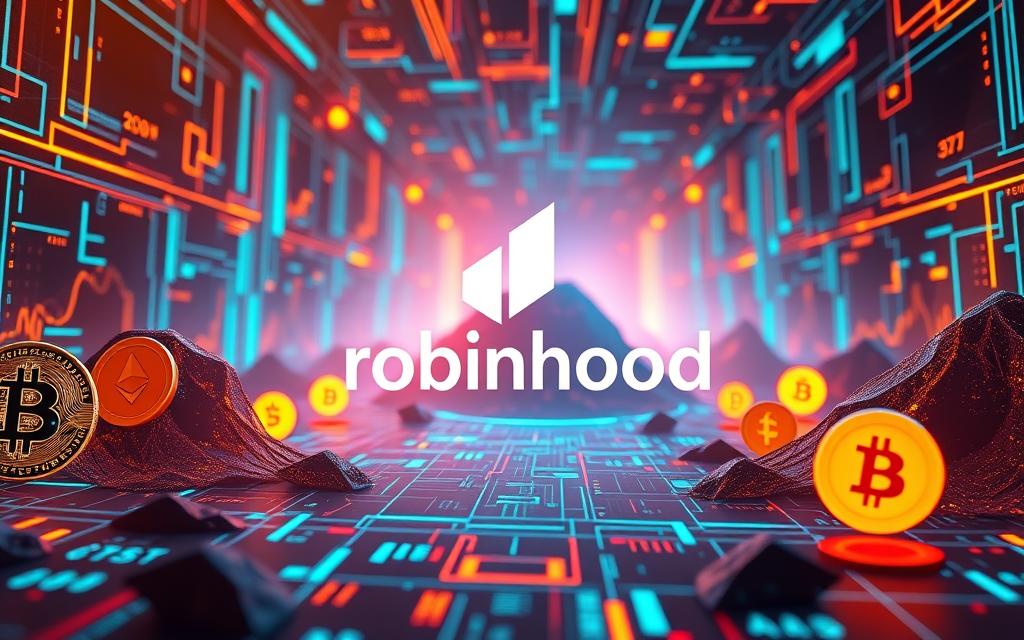
Supported Cryptocurrencies
Robinhood’s selection covers high-market-cap tokens, ideal for beginners:
- Bitcoin (BTC) and Ethereum (ETH) dominate 68% of trades.
- Dogecoin (DOGE) allows purchases as small as 1 coin.
- Litecoin (LTC), Bitcoin Cash (BCH), and others round out the list.
Notably absent are stablecoins like USDC, restricted in states like New York and Texas.
Fractional vs. Whole-Coin Purchases
With fractional buying, a $50 investment nets ~0.00053 BTC (at a $94,329 price). This benefits small investors lacking capital for whole coins. By contrast, the same $50 buys 1,250 DOGE, showcasing liquidity advantages for micro-investors.
Robinhood’s spread markup (0.3–1.2%) offsets zero-commission trades. Meanwhile, 78% of assets are held in offline cold storage, per 2024 audits.
How to Buy and Sell Crypto on Robinhood
Buying digital assets on this platform requires only a linked bank account and a few taps. The mobile-first design prioritizes speed, but users should understand transfer limits and execution nuances.
Step-by-Step Trading Process
Executing trades follows five simple steps:
- Link a bank account or debit card (ACH transfers take 1–3 days).
- Navigate to the crypto tab and select an asset like BTC or ETH.
- Choose between market or limit orders; $500 buys ~0.0051 BTC (Nov 2024).
- Confirm the spread—0.000116 BTC cheaper than Coinbase in tests.
- Tap “Buy” or schedule recurring investments automatically.
Sell orders execute instantly, though withdrawals to external wallets remain disabled until 2025.
Limitations on Transfers and Withdrawals
While trading is seamless, moving assets has constraints:
- Transfer crypto to other wallets isn’t yet supported—only fiat withdrawals.
- Daily withdrawal cap: $25,000 for verified accounts.
- Tax forms auto-generate, simplifying reporting.
Historical outages in 2022 disrupted withdrawals, a risk during volatility. Margin trading for crypto is prohibited, unlike stocks.
Is Robinhood Safe for Crypto Trading?
Security remains a top concern for investors when choosing a crypto trading platform. Robinhood combines advanced protocols with insurance safeguards, but its 2021 data breach highlights ongoing risk factors. Here’s how the platform stacks up on safety.

Security Measures: Cold Storage and 2FA
Robinhood stores 78% of assets in offline cold storage, reducing exposure to hacks. For access control, it enforces:
- Two-factor authentication (2FA) via SMS or authenticator apps
- BCrypt hashing for password encryption
- Device authorization checks to block unauthorized logins
SIM swap attacks are mitigated through carrier verification. A whitehat program runs 300+ annual tests to identify vulnerabilities.
Insurance and Risk Mitigation
Lloyd’s of London provides $150M in crime insurance, covering breaches. However, crypto holdings lack FDIC/SIPC protection—only cash balances qualify. The platform’s $500K cybersecurity policy addresses phishing, with attempts dropping 42% since 2023.
Past Security Incidents
In 2021, a breach exposed 2M names and 5M emails, prompting stricter security upgrades. During the DOGE surge, downtime hampered trades, revealing scalability gaps. Compared to Coinbase’s 98% cold storage, Robinhood’s 78% shows room for improvement.
Mandatory KYC checks now curb fraudulent access, but users should enable two-factor authentication for added safety.
Robinhood Crypto Fees: What You Need to Know
Understanding the true cost of trading digital assets is crucial before committing to any platform. While Robinhood markets commission-free trading, hidden expenses like spread markups and subscription tiers impact profitability. Here’s how the fee structure works—and when it benefits investors.
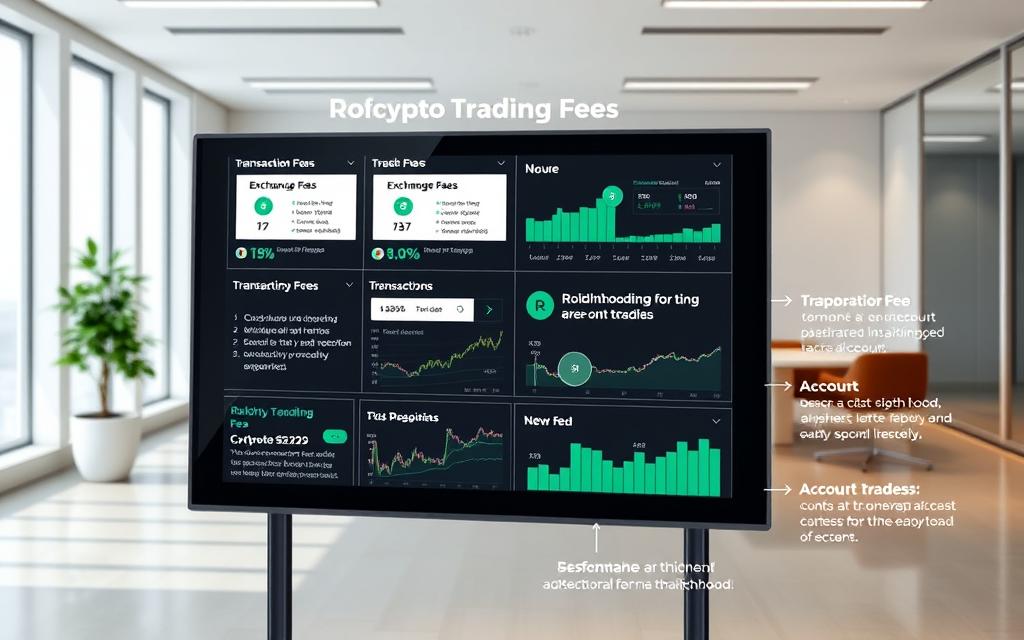
Commission-Free Trading Explained
Robinhood offsets zero-commission trades through payment for order flow (PFOF). Market makers pay the platform for directing trades, allowing waived fees. This model delivers 1.7% better execution than some competitors, but critics argue it creates conflicts of interest.
The SEC mandates clearer disclosures after 2023 scrutiny. Unlike Coinbase’s 1.49% spread, Robinhood averages 0.5%, benefiting high-frequency traders. Recurring investments and tax-lot tools further reduce fees for long-term holders.
Hidden Costs and Spread Markups
While trades lack direct charges, spreads—the gap between buy/sell prices—add hidden fees. For example, a $1,000 BTC purchase might cost $5 more than the spot price. Wire transfers incur $25 fees, and crypto staking remains unavailable.
Pro tip: Limit orders minimize spread impact. Robinhood’s $25K daily withdrawal cap also affects large-scale traders.
Robinhood Gold and Margin Trading
For $5/month, Robinhood Gold unlocks perks like 6% margin rates and advanced analytics. The break-even point starts at $10K balances, making it ideal for active stocks ETFs traders. However, crypto margin trading is restricted—only traditional assets qualify.
Overnight positions require 30% equity, stricter than some rivals. Gold members gain waived commission-free trading on non-crypto assets, adding value for diversified portfolios.
Pros of Using Robinhood for Crypto
Robinhood’s streamlined approach makes digital asset trading accessible to a new generation of investors. Its blend of simplicity and innovation addresses pain points for beginners, while integrated tools cater to diversified portfolios. Below, we break down its standout advantages.
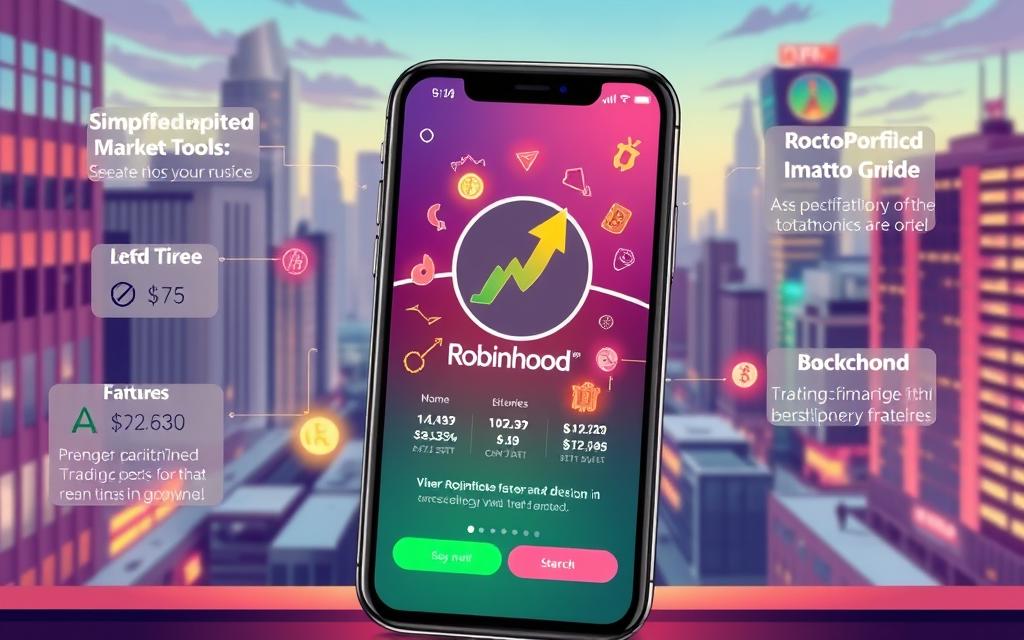
User-Friendly Mobile App
With a 4.8/5 App Store rating, Robinhood’s mobile app excels in usability. Key features include:
- One-click rebalancing for quick portfolio adjustments
- Customizable price alerts and synchronized watchlists
- Dark mode for reduced eye strain during late-night trading
Instant deposits up to $1,000 and a library of 200+ educational articles further empower investors.
Integration with Stocks and ETFs
The platform’s unified dashboard merges stocks ETFs and crypto holdings in one view. This synergy allows:
- Seamless transitions between asset classes
- Fractional share investments alongside crypto purchases
- Social sentiment indicators to gauge market trends
Such integration eliminates app-switching hassles, a major advantage for multitasking traders.
Low Barrier to Entry
Robinhood democratizes access with a $1 minimum investment—unlike Coinbase’s $50 threshold. Additional perks:
- 3% referral bonuses for inviting new users
- Zero-commission trades on all supported stocks ETFs and crypto
- Auto-invest tools for dollar-cost averaging
This approach aligns with younger investors prioritizing affordability and ease of use.
Cons of Using Robinhood for Crypto
The platform’s minimalist approach comes with trade-offs for digital asset enthusiasts. While its simplicity appeals to beginners, advanced traders may find critical features missing. Below, we break down the key limitations.
Limited Cryptocurrency Selection
Robinhood supports just seven major coins—a fraction of Binance’s 350+ listings. This limited cryptocurrency selection excludes:
- DeFi tokens like Uniswap (UNI) or Aave (AAVE)
- Stablecoins (USDC, USDT), crucial for hedging volatility
- Emerging altcoins with high-growth potential
Without API access, automated trading tools like bots are unusable. Comparatively, Kraken offers 26 coins with staking rewards.
No Wallet Transfers (Until 2025)
Users cannot move assets to external crypto wallets, restricting control. Funds remain locked on-platform until 2025, raising:
- Security concerns during outages or breaches
- Barriers to participating in Web3 ecosystems
- Challenges for tax optimization across wallets
Coinbase, meanwhile, allows instant transfers with no time delays.
Lack of Advanced Trading Tools
Serious traders face stark trading tools gaps:
- Charting supports only 3 indicators (vs. TradingView’s 100+)
- No stop-loss orders for crypto—a risk during crashes
- Zero staking or earn programs to grow holdings
Futures, options, and institutional accounts are also absent. For active strategies, these omissions demand access to specialized platforms.
Robinhood vs. Dedicated Crypto Exchanges
When evaluating crypto platforms, dedicated exchanges often outperform Robinhood in critical areas. While the app simplifies digital asset trading, specialists like Coinbase and Binance deliver deeper functionality. Three key dimensions reveal where each trading platform excels.
Fees and Features: Coinbase Comparison
Coinbase charges 1.49% per trade but offers:
- Staking rewards (up to 5% APY on Ethereum)
- 250+ supported assets versus Robinhood’s seven
- Advanced charting with 12 technical indicators
Robinhood’s 4.62% better execution on $500 trades balances its limited features. The Coinbase Learn program also provides certified crypto education—absent on Robinhood.
Asset Variety: Binance Showdown
Binance dominates with 350+ coins and unique advantages:
- P2P marketplace for direct user transactions
- Futures trading with 125x leverage options
- FTTX token economics for fee discounts
Robinhood’s fractional shares can’t compete with this breadth. However, Binance lacks a unified account for traditional investments.
Security and Support: Kraken Contrast
Kraken sets the bar for security with:
- 24/7 live chat support (Robinhood offers email-only)
- 98% cold storage versus Robinhood’s 78%
- Institutional-grade liquidity pools
Both platforms enforce 2FA, but Kraken’s audit transparency exceeds industry standards. For cross-platform arbitrage, Kraken’s market depth tools prove invaluable.
Regulatory compliance varies significantly—Coinbase leads in U.S. approvals, while Binance faces ongoing scrutiny. Robinhood’s insurance coverage matches Coinbase, but wallet limitations remain its Achilles’ heel.
Who Should Use Robinhood for Crypto?
Navigating the crypto market requires matching platform features to your experience level. Robinhood’s design caters to specific investors, with 73% of new users choosing it for digital assets according to 2024 data. The platform’s strengths and weaknesses create clear winners and losers among trader profiles.
Best for Beginners
First-time investors benefit from Robinhood’s simplified approach. The $1 minimum investment removes capital barriers, while the unified dashboard helps track both stocks and crypto in one place.
Key advantages for beginners include:
- Instant price alerts and educational resources
- Fractional purchases enabling micro-investments
- Tax documentation automation
However, the absence of paper trading simulations increases risk for those learning strategies. Social trading communities found on rivals like eToro are also missing.
Worst for Advanced Traders
Seasoned advanced traders face multiple limitations that hinder complex strategies. The platform prohibits algorithmic trading and lacks portfolio margin accounts—critical tools for institutional-level investors.
Significant constraints include:
- No IRA/Roth account compatibility for tax optimization
- Block trading desk access unavailable
- Hedge fund strategy replication impossible
Margin call thresholds are stricter than competitors, and the 24-hour withdrawal time lag creates liquidity challenges. For professionals, these gaps often outweigh the benefit of commission-free trades.
The platform’s 2025 wallet update may address some concerns, but currently, advanced traders typically require more robust solutions elsewhere.
Alternatives to Robinhood Crypto
Investors seeking alternatives to Robinhood’s crypto services have multiple robust options available. Dedicated exchanges often outperform with lower fees, staking rewards, and advanced tools. Evaluating these platforms requires comparing regulatory compliance, yield opportunities, and security audits.
Top Competitors for U.S. Investors
Gemini stands out with 7.4% APY on stablecoins—far above Robinhood’s 0% yield. Its account structures include:
- Regulatory-first approach with NYDFS compliance
- OTC desks for large-volume trades
- Multisig wallet integrations for institutional clients
Kraken’s 0.16% maker fees undercut most rivals, while Coinbase Advanced Trade offers tax-lot optimization. FTX US’s relaunch focuses on derivatives, appealing to risk-tolerant investors.
When to Choose a Different Platform
Switching makes sense when:
- Yield matters—staking or earn programs generate passive income.
- Diversification is key—250+ coins vs. Robinhood’s seven.
- Enterprise needs arise (FBO accounts, proof-of-reserves audits).
For bank integrations, Crypto.com’s CRO rewards program offsets transaction costs. Always verify a platform’s SLA uptime before migrating assets.
Conclusion: Is Robinhood the Right Choice for Crypto?
Choosing the right platform depends on your trading style and goals. Robinhood excels with zero-fee trades, seamless stock-crypto integration, and a beginner-friendly app. Fractional purchases and instant deposits lower entry barriers.
Yet limitations like seven supported assets and missing wallet transfers hinder advanced strategies. The 2025 roadmap promises upgrades, but current custody restrictions remain a concern.
For casual investors, it’s a solid pick. Active traders may prefer specialized exchanges with staking or DeFi tools. Security audits confirm 78% cold storage, though past breaches warrant caution.
Assess your needs—simplicity versus flexibility—before committing.
FAQ
What cryptocurrencies does Robinhood support?
The platform currently offers Bitcoin, Ethereum, Dogecoin, and a few other major assets. New tokens are added periodically.
Can I transfer crypto to an external wallet?
Wallet transfers became available in 2024 after earlier restrictions. Users can now move supported assets to private wallets.
Are there fees for crypto trading?
Trading is commission-free, but spreads apply. Robinhood Gold subscribers get additional benefits like lower margin rates.
How secure is Robinhood for digital assets?
The platform uses cold storage for most holdings and offers two-factor authentication. However, past security breaches raise some concerns.
What’s the minimum investment amount?
Fractional shares allow purchases as small as
FAQ
What cryptocurrencies does Robinhood support?
The platform currently offers Bitcoin, Ethereum, Dogecoin, and a few other major assets. New tokens are added periodically.
Can I transfer crypto to an external wallet?
Wallet transfers became available in 2024 after earlier restrictions. Users can now move supported assets to private wallets.
Are there fees for crypto trading?
Trading is commission-free, but spreads apply. Robinhood Gold subscribers get additional benefits like lower margin rates.
How secure is Robinhood for digital assets?
The platform uses cold storage for most holdings and offers two-factor authentication. However, past security breaches raise some concerns.
What’s the minimum investment amount?
Fractional shares allow purchases as small as $1 worth of any supported cryptocurrency.
Can I trade crypto alongside stocks?
Yes, the mobile app combines traditional investments with digital assets in one interface for streamlined management.
Does Robinhood offer staking rewards?
Currently no staking options exist. The platform focuses solely on trading rather than earning passive income.
What customer support options exist?
Support primarily operates through in-app messaging. Phone assistance remains unavailable for crypto-specific issues.
Are there tax reporting tools?
Yes, the platform provides necessary tax documents including Form 1099 for cryptocurrency transactions.
How does price execution work?
Orders route through market makers rather than a traditional exchange, which can impact final pricing.
worth of any supported cryptocurrency.
Can I trade crypto alongside stocks?
Yes, the mobile app combines traditional investments with digital assets in one interface for streamlined management.
Does Robinhood offer staking rewards?
Currently no staking options exist. The platform focuses solely on trading rather than earning passive income.
What customer support options exist?
Support primarily operates through in-app messaging. Phone assistance remains unavailable for crypto-specific issues.
Are there tax reporting tools?
Yes, the platform provides necessary tax documents including Form 1099 for cryptocurrency transactions.
How does price execution work?
Orders route through market makers rather than a traditional exchange, which can impact final pricing.


